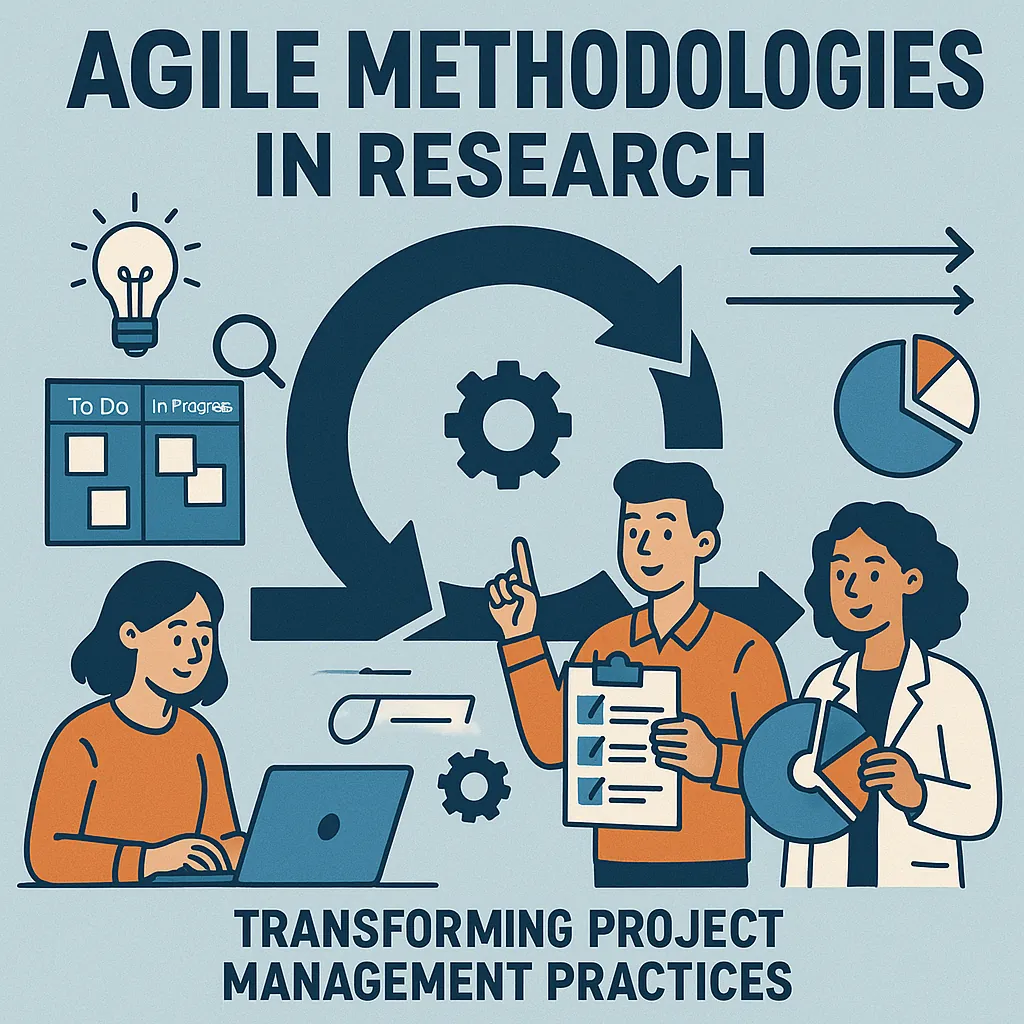Introduction to Agile Methodologies
Agile methodologies have emerged as a transformative approach in project management, particularly within the realms of research and academia. These methodologies emphasize flexibility, collaboration, and iterative progress, making them well-suited for the dynamic and often uncertain nature of research projects. Below, we explore the foundational aspects of Agile methodologies, their core principles, and their relevance to research project management.
Defining Agile Methodologies and Core Principles
Agile methodologies are a collection of project management frameworks that prioritize adaptive planning, evolutionary development, early delivery, and continual improvement. The core principles of Agile include:
- Customer Collaboration: Engaging stakeholders throughout the project to ensure that the end product meets their needs.
- Iterative Development: Breaking projects into smaller, manageable phases that allow for regular assessment and adjustment.
- Flexibility: Embracing change and adapting to new information or shifting project requirements.
- Cross-Functional Teams: Encouraging collaboration among diverse team members to leverage different skills and perspectives.
These principles foster an environment where teams can respond quickly to changes, which is particularly beneficial in research settings where new findings can alter project trajectories [1][10].
Overview of Agile Frameworks
Several Agile frameworks can be applied to research project management, each offering unique methodologies:
- Scrum: This framework organizes work into time-boxed iterations called sprints, typically lasting two to four weeks. Scrum emphasizes regular feedback and team accountability, making it ideal for projects requiring frequent reassessment and adaptation [1][12].
- Kanban: Kanban focuses on visualizing work in progress and managing flow. It allows teams to prioritize tasks dynamically and adjust workloads based on current project demands, which is particularly useful in research environments where priorities may shift rapidly [9][10].
- Lean: Lean methodologies aim to maximize value while minimizing waste. In research, this can translate to optimizing resource use and streamlining processes to enhance efficiency and effectiveness [9][10].
Traditional Project Management Approaches vs. Agile
Traditional project management approaches, often characterized by linear and sequential processes (such as the Waterfall model), can be less effective in research contexts. These methods typically involve extensive upfront planning and rigid adherence to timelines, which may not accommodate the evolving nature of research projects. In contrast, Agile methodologies promote a more flexible and responsive approach, allowing teams to pivot as new information emerges or as project goals evolve [4][10].
Benefits of Agile in Dynamic and Uncertain Research Environments
The application of Agile methodologies in research offers several key benefits:
- Enhanced Responsiveness: Agile practices enable research teams to quickly adapt to new findings or changes in project scope, ensuring that the research remains relevant and impactful [4][8].
- Improved Collaboration: By fostering cross-functional teamwork and stakeholder engagement, Agile methodologies enhance communication and collaboration, which are critical in research settings [8][10].
- Increased Efficiency: Agile frameworks, such as Scrum and Kanban, help streamline processes and reduce bottlenecks, allowing research teams to focus on delivering results more effectively [9][10].
- Higher Quality Outcomes: The iterative nature of Agile allows for continuous feedback and improvement, leading to higher quality research outputs that are better aligned with stakeholder needs [4][8].
The Need for Agile in Research Projects
The application of Agile methodologies can significantly enhance the effectiveness and adaptability of project execution. Research projects often face unique challenges that traditional project management approaches may not adequately address. Here are some key points illustrating the necessity of Agile practices in research settings:
Common Issues in Research Project Management:
- Changing Requirements: Research projects frequently encounter evolving objectives and hypotheses as new data emerges. This fluidity can lead to misalignment between project goals and outcomes if not managed effectively. Agile methodologies, with their emphasis on flexibility and responsiveness, allow teams to adapt to these changes seamlessly, ensuring that the project remains relevant and aligned with current findings [4][8].
- Stakeholder Involvement: Engaging stakeholders—such as funding bodies, academic peers, and community partners—can be challenging in research projects. Their expectations and feedback can shift throughout the project lifecycle. Agile practices promote continuous collaboration and communication, enabling project managers to incorporate stakeholder input regularly, thus enhancing project buy-in and relevance [2][3].
Iterative Nature of Research:
- Research is inherently iterative, often requiring multiple cycles of hypothesis testing, data collection, and analysis. This iterative process aligns well with Agile’s core principle of incremental development. By breaking down research into smaller, manageable phases, teams can focus on delivering results more frequently, allowing for timely adjustments based on feedback and findings. This approach not only enhances productivity but also fosters a culture of continuous improvement within research teams [7][12].
Limitations of Traditional Methods:
- Traditional project management methodologies, such as the Waterfall model, often impose a linear structure that can be restrictive in the dynamic environment of research. For instance, a Waterfall approach may require extensive upfront planning and rigid adherence to a predetermined timeline, which can stifle innovation and responsiveness to new insights. In contrast, Agile methodologies encourage flexibility, enabling research teams to pivot as necessary and explore new avenues of inquiry without being constrained by a fixed plan [9][10].
- Additionally, traditional methods may not adequately facilitate the collaborative nature of research, where interdisciplinary teams must work together to solve complex problems. Agile’s focus on self-organizing teams and collaborative decision-making can enhance team dynamics and foster a more innovative research environment [1][6].
Applying Agile Practices to Research Projects
The adoption of Agile methodologies can significantly enhance project management practices. By transitioning from traditional approaches to Agile, research project managers can foster a more dynamic and responsive environment that encourages collaboration and innovation. Here are practical steps to implement Agile methodologies effectively in research settings:
Steps to Transition from Traditional to Agile Methodologies in Research
- Assess Team Readiness: Before diving into Agile practices, evaluate your team’s readiness for this paradigm shift. Consider their familiarity with Agile principles and their willingness to adapt to new workflows [3].
- Start Small: Initiate the transition with a single research project. This allows the team to experiment with Agile practices without overwhelming them. Gather feedback and refine the approach before scaling it to larger projects [10].
- Define Clear Objectives: Establish a clear vision for the research project. This will guide the team in aligning their efforts and understanding the desired outcomes [14].
Establishing Cross-Functional Teams and Roles
- Form Cross-Functional Teams: Agile thrives on collaboration. Create cross-functional teams that include members from various disciplines relevant to the research project. This diversity fosters creativity and problem-solving [4].
- Define Roles: Assign specific roles within the team, such as:
- Product Owner: Responsible for defining project goals and prioritizing tasks based on stakeholder needs.
- Scrum Master: Facilitates the Agile process, ensuring that the team adheres to Agile principles and practices [6].
Utilizing Sprints and Iterations for Research Phases
- Implement Sprints: Break down the research project into smaller, manageable phases known as sprints. Each sprint should have a defined goal, allowing the team to focus on specific tasks within a set timeframe [7].
- Iterative Development: Embrace an iterative approach where each sprint culminates in a review of progress. This allows for adjustments based on findings and insights gained during the research process [8].
Incorporating Regular Feedback Loops and Stakeholder Engagement
- Establish Feedback Mechanisms: Regularly solicit feedback from stakeholders throughout the research process. This can be achieved through sprint reviews or stakeholder meetings, ensuring that their input is integrated into the project [11].
- Engage Stakeholders Continuously: Keep stakeholders informed and involved at every stage of the project. This engagement not only enhances transparency but also fosters a sense of ownership among stakeholders, which can lead to better project outcomes [12].
By implementing these Agile practices, research project managers can transform their project management approach, leading to more efficient processes, improved collaboration, and ultimately, more successful research outcomes. Embracing Agile methodologies in research not only aligns with the fast-paced nature of modern research but also empowers teams to adapt and thrive in an ever-changing environment.
Tools and Techniques for Agile Research Management
The adoption of Agile methodologies can significantly enhance efficiency and adaptability. This section explores various tools and techniques that facilitate Agile practices, making them particularly suitable for project managers in research and academia.
Overview of Project Management Tools Suitable for Agile
- Jira: Jira is a robust tool that supports various Agile frameworks, including Scrum and Kanban. It allows research teams to create user stories, manage backlogs, and track progress through customizable workflows. Its integration capabilities with other tools like Trello and Figma enhance collaboration and streamline project management processes [1][6].
- Trello: Trello offers a visual approach to project management, making it easy for research teams to organize tasks and track progress. Its card-based system allows for flexible task management, which is ideal for the iterative nature of research projects. Teams can create boards for different phases of research, facilitating clear visibility and collaboration [1][11].
- Asana: Asana is another versatile project management tool that supports Agile practices. It enables teams to set priorities, assign tasks, and monitor deadlines effectively. Asana’s timeline feature helps research teams visualize project timelines, ensuring that all members are aligned on goals and deadlines [11][14].
Techniques for Effective Backlog Management and Prioritization
- Backlog Grooming: Regularly reviewing and refining the backlog is crucial for maintaining focus on high-priority tasks. Research teams should schedule grooming sessions to assess the relevance of tasks, ensuring that the backlog reflects current project needs and priorities [12].
- Prioritization Frameworks: Utilizing frameworks such as MoSCoW (Must have, Should have, Could have, Won’t have) can help research teams prioritize tasks effectively. This method allows teams to focus on critical tasks that align with research objectives, ensuring that resources are allocated efficiently [12].
- User Story Mapping: This technique involves visualizing the user journey and breaking down tasks into manageable user stories. By mapping out the user experience, research teams can identify key features and prioritize tasks that deliver the most value [12].
Best Practices for Facilitating Daily Stand-ups and Retrospectives in Research Teams
- Daily Stand-ups: Conducting brief daily stand-up meetings can enhance communication and accountability within research teams. These meetings should be time-boxed (typically 15 minutes) and focus on three key questions: What did you accomplish yesterday? What will you work on today? Are there any blockers? This format encourages team members to share progress and address challenges promptly [8][15].
- Retrospectives: Regular retrospectives are essential for continuous improvement. Research teams should hold these meetings at the end of each sprint or project phase to reflect on what went well, what could be improved, and how to implement changes moving forward. Creating a safe environment for open discussion fosters a culture of learning and adaptation [8][15].
- Utilizing Feedback Loops: Incorporating feedback loops into the research process allows teams to gather insights from stakeholders and adjust their approach accordingly. This practice not only enhances the quality of research outcomes but also ensures that the project remains aligned with stakeholder expectations [12][15].
By leveraging these tools and techniques, research project managers can effectively implement Agile methodologies, leading to more dynamic and responsive project management practices. This transformation not only improves team collaboration but also enhances the overall quality and impact of research outcomes.
Case Studies: Successful Agile Implementation in Research
Agile methodologies have increasingly found their way into research project management, offering innovative solutions to the unique challenges faced in various fields. Below are several case studies that illustrate how Agile practices have been effectively applied in research projects across different domains, highlighting the challenges encountered and the positive outcomes achieved.
1. Social Sciences: Collaborative Research Initiatives
Agile practices have been utilized to enhance teamwork and collaboration among researchers. A study by Hidalgo (2018) emphasizes the application of Agile Project Management to address the complexities of collaborative research projects. The challenges included coordinating diverse teams and managing varying timelines. By implementing Agile principles, such as iterative planning and regular feedback loops, the project teams were able to improve communication and adapt to changing research needs. This led to a more cohesive team dynamic and increased stakeholder engagement, ultimately resulting in higher quality research outputs [3][4].
2. Technology: Agile in Software Development Research
A notable case in the technology sector involved an avionics company that adopted Agile software development practices. The introduction of Agile methodologies allowed the team to navigate the intricacies of safety-critical system engineering effectively. The study highlighted that traditional project management approaches were often too rigid to accommodate the fast-paced nature of technological advancements. By embracing Agile, the team could respond swiftly to changes, leading to improved project delivery times and enhanced product quality. The Agile framework facilitated better risk management and fostered a culture of continuous improvement, which was crucial for meeting stringent safety standards [9][12].
3. Healthcare: Agile Transformation in Clinical Research
In healthcare, the Agile transformation of Brazil’s credit bureau, Boa Vista, serves as a compelling example. The organization faced significant challenges with lengthy product releases and bureaucratic hurdles. By adopting Agile principles and the Scrum framework, they transitioned from a Waterfall approach to more flexible Agile teams. This shift not only streamlined their processes but also improved stakeholder satisfaction by delivering results more rapidly. The case study illustrates how Agile practices can lead to enhanced responsiveness to patient needs and regulatory requirements, ultimately resulting in better healthcare outcomes [10][11].
4. Cross-Disciplinary Research: Evidence-Based Management
Another case study focused on the use of Evidence-Based Management (EBM) within research teams. This approach integrates Agile methodologies with data-driven decision-making, allowing teams to assess their performance continuously. The implementation of EBM helped researchers identify bottlenecks and inefficiencies in their workflows. By applying Agile practices, such as regular retrospectives and adaptive planning, teams were able to make informed adjustments that significantly improved project delivery and stakeholder satisfaction. This case underscores the versatility of Agile methodologies in enhancing research project management across various disciplines [2][15].
Measuring Success in Agile Research Projects
The adoption of Agile methodologies can significantly enhance the effectiveness and adaptability of project execution. To ensure that Agile practices are yielding the desired outcomes, it is crucial to establish a framework for measuring success. Here are key points to consider when evaluating the effectiveness of Agile practices in research projects:
Establish Key Performance Indicators (KPIs)
- Defining Success: The first step in measuring success is to clearly define what Agile success looks like for your research project. This involves identifying specific goals and objectives that align with the overall research aims [7].
- Schedule Variance: One important KPI is schedule variance, which compares the planned schedule against the actual timeline. This metric helps project managers determine if the project is on track or if there are delays that need to be addressed [3].
- Value Delivery: Agile teams should focus on delivering value to stakeholders. This can be measured through customer satisfaction surveys or feedback mechanisms that assess how well the project meets the needs of its intended audience [6].
Qualitative and Quantitative Methods for Measuring Project Success
- Quantitative Metrics: Metrics such as lead time and cycle time are essential for quantifying project performance. Lead time measures the total time from task creation to completion, while cycle time focuses on the time taken to complete a task once work has started [9]. These metrics provide a clear picture of efficiency and productivity within the Agile framework.
- Qualitative Assessments: In addition to quantitative measures, qualitative methods such as stakeholder interviews and team retrospectives can provide valuable insights into the project’s success. These assessments can reveal how well the team collaborates and communicates, which are critical factors in Agile project management [11].
Importance of Continuous Improvement
- Feedback Loops: Agile methodologies emphasize the importance of continuous improvement. Regular feedback from team members and stakeholders allows project managers to adapt practices and processes based on real-time insights [5]. This iterative approach not only enhances project outcomes but also fosters a culture of learning within the team.
- Adapting Practices: As research projects evolve, so too should the Agile practices employed. By regularly reviewing performance metrics and soliciting feedback, project managers can make informed adjustments to their methodologies, ensuring that they remain aligned with project goals and stakeholder expectations [4].
Challenges and Considerations
Challenges and Considerations
Adopting Agile methodologies in research projects can significantly enhance flexibility and responsiveness, but it is not without its challenges. Here are some common obstacles faced by project managers in research and academia, along with strategies to overcome them.
Common Challenges
- Resistance to Change: One of the most prevalent challenges is the resistance from team members who may be apprehensive about shifting from traditional project management methods to Agile practices. This resistance often stems from a fear of disrupting established workflows and uncertainty about new methodologies [4].
- Lack of Training: Many research teams may not have adequate training in Agile methodologies, leading to misunderstandings about its principles and practices. This knowledge gap can hinder effective implementation and reduce the potential benefits of Agile [12].
- Limited Customer Availability: In research settings, stakeholders (such as funding bodies or end-users) may not always be readily available for feedback, which is crucial in Agile processes. This can lead to delays and misalignment with project goals [12].
- Communication Issues: Effective communication is vital in Agile environments. However, research teams often face challenges in maintaining clear and consistent communication, which can lead to misunderstandings and project setbacks [11].
Importance of Leadership Buy-In and Cultural Shifts
For Agile practices to take root in research projects, it is essential to secure leadership buy-in. Leaders play a critical role in fostering a culture that embraces change and innovation. Their support can help:
- Encourage Team Engagement: When leaders advocate for Agile methodologies, it can motivate team members to engage with the new processes and understand their benefits.
- Facilitate Cultural Shifts: Transitioning to Agile requires a cultural shift within research teams, emphasizing collaboration, flexibility, and iterative progress. Leaders must model these values and encourage their adoption throughout the team [10].
Strategies for Overcoming Challenges
- Provide Comprehensive Training: Invest in training programs that equip team members with the necessary skills and knowledge about Agile methodologies. This can include workshops, online courses, and mentorship opportunities to build confidence in using Agile practices [12].
- Foster Open Communication: Establish regular check-ins and feedback loops to ensure that all team members are aligned and can voice their concerns. Utilizing collaborative tools can enhance communication and keep everyone informed about project developments [11].
- Pilot Agile Practices: Start with small pilot projects to demonstrate the effectiveness of Agile methodologies. This allows teams to experiment with Agile practices in a controlled environment, making it easier to identify and address challenges before scaling up [8].
- Encourage a Growth Mindset: Promote a culture that values learning and adaptation. Encourage team members to view challenges as opportunities for growth and to embrace the iterative nature of Agile, where feedback is integral to improvement [14].
By addressing these challenges and fostering an Agile mindset, project managers in research and academia can effectively implement Agile methodologies, leading to more adaptive and successful project outcomes.
Conclusion and Future of Agile in Research
In the rapidly evolving landscape of research and academia, Agile methodologies have emerged as a transformative force in project management. By embracing Agile practices, research project managers can significantly enhance their project outcomes and foster a more adaptive and collaborative environment. Here are the key insights regarding the benefits of Agile methodologies for research project management:
- Enhanced Flexibility and Responsiveness: Agile methodologies allow research teams to adapt quickly to changing project requirements and emerging findings. This flexibility is crucial in research, where new data can shift the direction of a project unexpectedly. Agile’s iterative approach enables teams to reassess and realign their goals regularly, ensuring that the research remains relevant and impactful.
- Improved Collaboration and Communication: Agile emphasizes teamwork and open communication, which are vital in research settings. By utilizing Agile practices, project managers can facilitate better collaboration among team members, stakeholders, and external partners. Regular stand-up meetings and sprint reviews promote transparency and collective problem-solving, leading to more innovative solutions.
- Increased Focus on User Needs: Agile methodologies prioritize understanding the needs of end-users, which is particularly important in research that aims to address real-world problems. By incorporating user feedback throughout the research process, project managers can ensure that their findings are applicable and beneficial to the intended audience.
- Faster Delivery of Results: The iterative nature of Agile allows research teams to deliver findings incrementally. This approach not only accelerates the research process but also enables stakeholders to receive valuable insights sooner, facilitating timely decision-making and application of results.
As we look to the future, it is essential for project managers in research and academia to continue exploring and experimenting with Agile practices. The following trends are likely to shape the future of Agile in research:
- Integration of Technology: The adoption of advanced project management tools that leverage AI and machine learning will enhance Agile practices in research. These tools can automate routine tasks, streamline data collection, and provide actionable insights, allowing project managers to focus on strategic decision-making.
- Hybrid Methodologies: The blending of Agile with other methodologies, such as Design Thinking, will become more prevalent. This hybrid approach can enhance innovation and user satisfaction by combining the strengths of both frameworks, leading to more effective research outcomes.
- Expansion Across Disciplines: Agile methodologies are expected to expand beyond traditional research fields into new areas, fostering interdisciplinary collaboration. This expansion will encourage diverse teams to tackle complex research challenges more effectively.
In conclusion, Agile methodologies offer a wealth of benefits for research project management, from increased flexibility and collaboration to faster delivery of results. Project managers are encouraged to embrace these practices and remain open to experimentation, as the future of Agile in research holds great promise for enhancing project outcomes and driving innovation in academia.
Find out more about Shaun Stoltz https://www.shaunstoltz.com/about/.
This post was written by an AI and reviewed/edited by a human.



